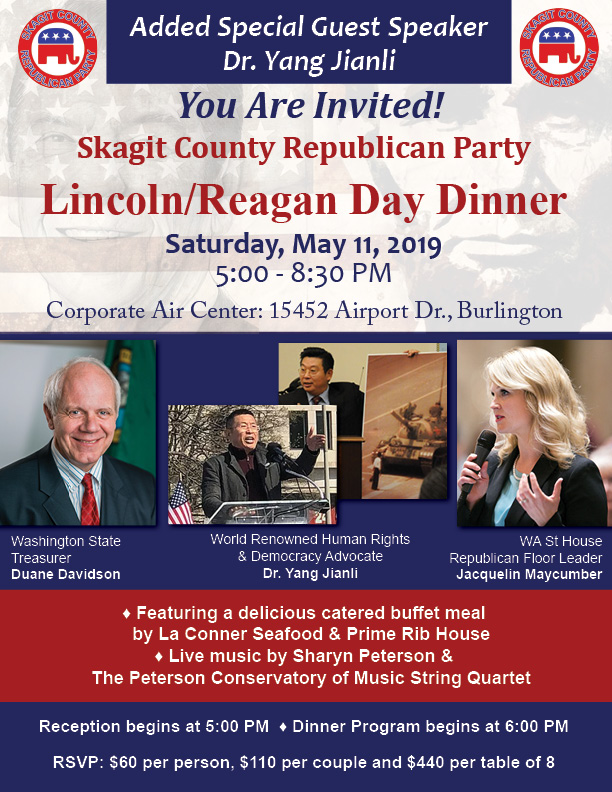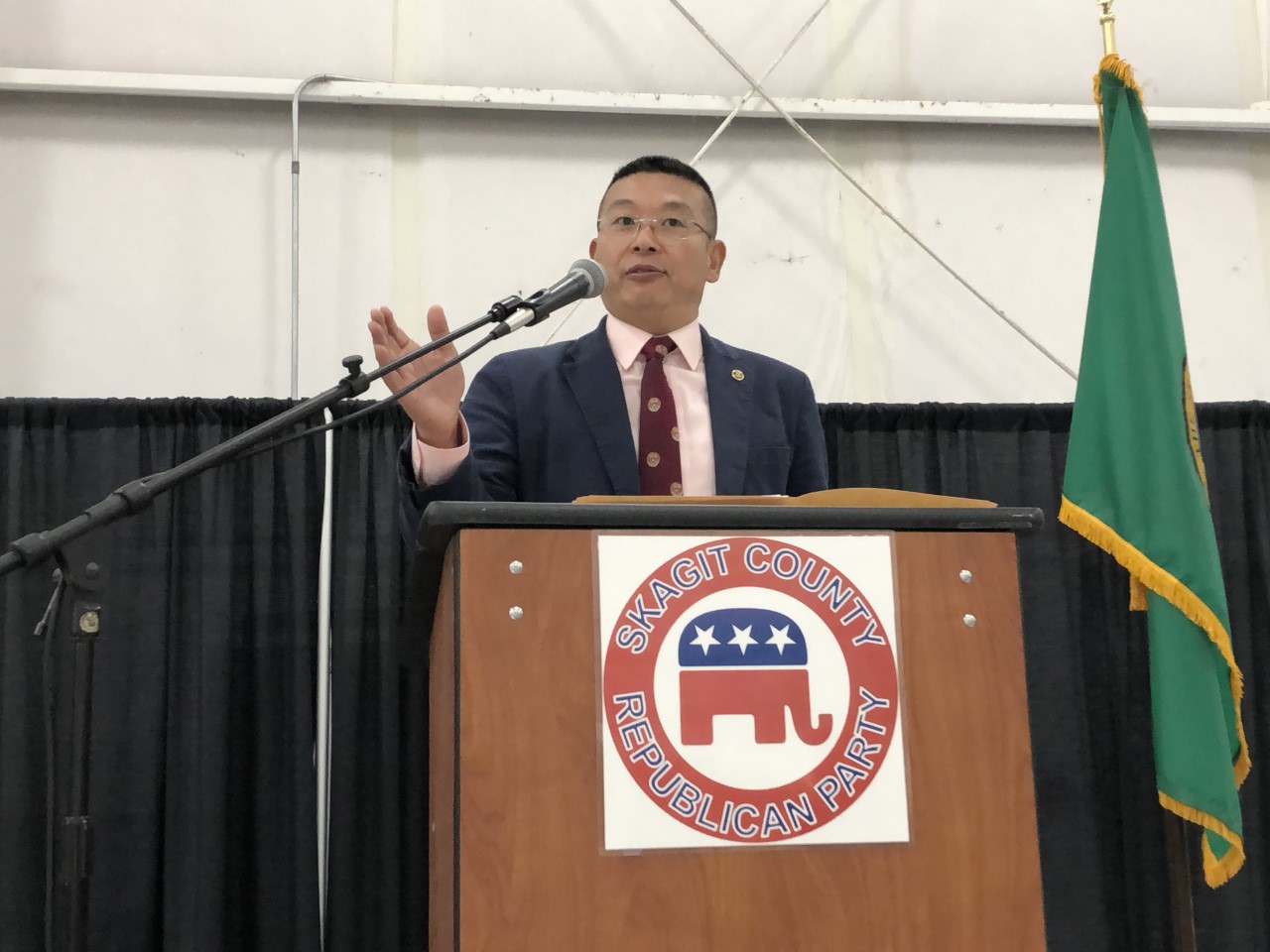《議報》記者 周宏:楊建利在美國共和黨地方黨部林肯/里根晚餐年會上發表主題演講
《議報》記者 周宏
2019年5月12日

5月11日(星期六)晚公民力量發起人楊建利博士在“六四”三十周年前夕應邀在美國共和黨地方黨部的年度活動上發表主題演講,活動是由共和黨華盛頓州Skagit縣黨部舉辦的林肯/里根晚餐年會,近300位共和黨活躍分子和支持者參加了活動。


楊建利主題演講的題目是“讓美國再次偉大:林肯和里根是川普總統和美國人民的光輝榜樣”。楊建利首先簡述了自己對社會主義專制制度災難的親身經歷,進而講述了“六四”后美國對中共綏靖政策造成目前對美國和自由世界以及中國民主化前景不利的局面。楊建利讚美林肯和里根,說這兩位他所特別敬仰的美國總統都是“解放者”。楊建利說“林肯總統不僅解放了黑奴,而且在美國價值原則純粹性的基礎上保衛了美國聯邦,這純粹的價值原則就是:民主、自由、平等。里根總統1987年6月12日站在離柏林牆100碼之處發表他被後人最為稱讚和紀念的演講‘戈爾巴喬夫先生,推到這堵牆!’他的遠見和道義勇氣領導自由世界贏得了冷戰的勝利”,他說:“根本上說,美國是一個以價值觀為基石建立的國家,從華盛頓到傑佛遜,從林肯到里根,美國的腳步一直有理想和信仰指引,這種理想主義的特質不僅在國家層面上確保了穩固和繁榮,也在個體層面上激發了美國人的創造力和潛能。抽去了理想主義和對美國價值的信仰,美國將會在根本上失去其作為一個偉大國家的動力,甚至可以說失去了靈魂,因而也無從談到偉大。美國面臨過不止一次危機,如內戰、二戰、冷戰、911恐怖襲擊,但我們會發現,美國人對危機的應對,往往成為內在潛能被激發的機會。為什麼危機會帶給美國發展的動力?這與美國的理想主義和價值觀基石是密不可分的:就短期來講,民主制度並不保證最高效率,也無法避免任何社會都會逐漸滋生的富貴病和慵惰心理,危機意識是對社會的一種必要刺激,而美國的民主制度可以確保其面對危機時的團結和凝聚力,並喚起美國人對國家和自由制度的自豪感。”
楊建利特別針對中美貿易爭端做了如下論述“林肯面對的問題當然不同於川普,但如果我們不恰當把‘北方——南方’與‘美國——中國’做一個不恰當的比喻的話,他們的處境頗為相似,也許是值得川普深思的。19世紀初,黑人奴隸問題在美國本已呈現式微趨勢,但南方棉花種植業的繁榮開啟了美國國內販奴的又一波熱潮,形成了國內販奴的‘第二條中間道路’,前後約三十年時間,南方利用調動資源的低人權成本(奴隸制)和北方提供的自由市場,獲得棉花貿易的巨大財富,使南方奴隸主產生了對奴隸制的“制度自信”;上世紀九十年代初,蘇聯的解體和中國的六四事件導致共產主義意識形態破產,幾乎全世界都樂觀地以為歷史將要‘終結’,但同樣是三十年左右的時間,中共利用低人權、低環保成本以及西方提供的自由市場迅速成長,不僅擺脫了六四後人們對其政權是否還能穩定的疑問,反而產生了‘四個自信’,開始藉助其越來越強大的經濟和軍事實力,開始挑戰所謂的‘美國霸權’。200年前,內部的低人權和外部的自由市場造就了美國南方奴隸主的強大和自信,同樣的,進30年來,內部的低人權和外部的自由市場造就了中共專制政權的強大和自信。林肯當年面對這抉擇:對南方關閉市場而不管它的奴隸制度,或者,結束它的奴隸制度。我們每一個人知道林肯的最終選擇。”
楊建利最後追問“面對著中共,川普總統能否效法林肯面對南方奴隸制時、里根面對蘇聯共產帝國時所做偉大壯舉?”
楊建利演講結束時,全場起立鼓掌。
附演講英文稿原文
To Make America Great Again: Lincoln and Reagan Standing as Shining Examples for President Trump and American People to Follow
–Speech at Skagit County Republican Lincoln/Reagan Dinner
Yang Jianli
May 11, 2019, Skagit, State of Washington, USA
Good evening. Thank you Jacquelin for your kind introduction. What an honor to be in the company of you and Mr. Davidson speaking at this Lincoln/Reagan Dinner. Lincoln and Reagan are definitely among the American presidents I admire most. They are both liberators.
President Lincoln not only freed the slaves but saved the Union. He not only saved the Union, but saved it “in the purity of its principles”, that is, in the principles of democracy, liberty, and equality. He redefined the concept of freedom.
On June 12, 1987, President Reagan stood just 100 yards away from the Berlin Wall and uttered some of the most unforgettable words of his presidency: “Mr. Gorbachev, tear down this wall.” Berlin Wall stood as a vivid symbol of the battle between communism and democracy that divided Berlin, Germany and the entire European continent. His vision and guts helped the free world win the Cold War and defeated communism in Europe.
Few of you in this room know what it feels like to be blessed with freedom after living under the oppression of socialism and communism. When the Venezuelan military vehicles drove into a crowd of civilians about two weeks ago, I was reminded of the horrors of the Chinese tanks running over students in the Tiananmen Square Massacre whose 30th anniversary we will commemorate next month. The dictators have done in Venezuela all of the similar things that the dictators have done in China. Be it socialism with Chinese characteristics or Venezuelan characteristics. The results have been catastrophic. I have a first-hand understanding of these catastrophes.
I was born three years before the Cultural Revolution. At an early age, the unspeakable sufferings that most families had at the hands of the communist dictatorship, including mine, made me disenchanted with the Chinese Communist Party (the CCP). However, I was enticed into joining the party with the idea of reforming it from within. This all changed when I returned from my Ph.D. studies in the U.S., to join thousands of my fellow students in Beijing as Chinese army tanks rolled across Tiananmen Square on the morning of June 4, 1989. Luckier than most of my fellow students, I narrowly escaped the massacre and the ensuing arrests and returned to the United States. While I continued my studies, I immersed myself in the work advancing human rights and democracy in China. In the Party’s eyes, the former young communist star had now become a public enemy. I became persona non grata, a traitor, prohibited from entering the country. But in the spring of 2002, I decided to defy the ban. In China’s industrial northeast, thousands of workers were taking to the streets, protesting the destitution brought on by government exploiting policies. Sensing an opportunity to forge bonds with grassroots activists, I entered China using a borrowed passport and forged ID card.
For two weeks I met with exploited construction laborers, expropriated farmers, and striking workers, documenting their grievances and the condition of their lives and helping them with non-violent struggle strategies. But as I attempted to slip out of China across the Burmese border, my fake ID was spotted and I found myself in the hands of the security police.
I was detained for five years. Much of those years I spent in solitary confinement. My mental condition deteriorated beneath endless isolation, repeated interrogations and ongoing psychological and physical torture. I prayed and prayed to God for understanding of his purpose for me and for spiritual strength to sustain myself. I resorted to composing poems in my head and committing them to memory as a means of maintaining my sanity. Nearing a breakdown, I grasped onto my innermost resources of belief, imagination, and will to fend off insanity and find a reason to live. “Am I wrong?” I asked myself with a tinge of regret. But I repeated a thought experiment: imagining of myself taking a copy of the Universal Declaration of Human Rights, arbitrarily choosing anyone on the Chinese streets, showing the document, asking them with the language they understand whether they want the rights listed there. Would anybody say No? Of course, Not. Nobody wants to be a slave. In this regard, the Chinese people are no different than any other people in the world. The thirst for freedom and dignity is indeed universal. I drew strength and inspiration from this first order of fact.
I also thought of my fallen brothers and sisters in Tiananmen Square. I reassured myself that freedom is not free. Freedom must be earned. It was not free for those who paid with their lives. It is certainly not free for those of us who, while still blessed with our lives, have yet to complete the mission for which these brave students gave their lives and their freedom. I must not give up!
To make a long story short, in 2007, thanks to the overwhelming support from America and the international community, I was freed, returned to the US and recommitted myself to the hard work to advance human rights and democracy in China.
We were asked by American friends after Tiananmen: “Yes, we believe in the universality of democracy and freedom, but other than that, why should we care about whether, and how fast, China becomes democratic?”
My answer was simple. “If China is allowed to continue its path of economic and military buildup under a one-party dictatorship, it will pose a serious threat to the security and economic interest of America and even its very democratic way of life.”
Unfortunately, what I said nearly 30 years ago has become a reality today.
China has been waging economic war against industrial democracies ever since America allowed it a normal trade status. And now China has emerged as the greatest economic and national security threat the United States has ever faced. America is running the largest trade deficit with China, $350 billion annually. We must not forget China’s human rights deficit has contributed largely to America’s trade deficit with China. Low human rights is a big advantage of China in trading with free market economies just like the slavery system is an advantage of the South in trading with the North before the Civil War.
China is serving as a model for dictators and juntas. In fact, it is already a model and a leading supporter of these regimes. Pick a dictator anywhere on the globe—from North Korea to Venezuela, from Cuba to Iran—and you’ll almost certainly find that the CCP is supporting it today.
In the United States today, the CCP takes advantage of our freedom and democracy to solidify its position at home. It, or its surrogates, has wide access to our universities, think tanks, and media through which they can advance their opinions and rationalize their actions.
The Chinese government has co-opted numerous American businessmen and academics by providing them with favorable business opportunities and all manner of privileges; in turn, they serve the purposes and interests of the Chinese government back in America as lobbyists for favorable policies towards China.
Make no mistake, the expansion of China’s military power is also a significant and alarming development. Throughout past decades, China’s defense budget has increased much faster than its GDP. The Chinese People’s Liberation Army is acquiring more than enough power to intimidate surrounding East Asian countries, some of them America’s allies.
President Trump’s raising tariffs on China’s import yesterday demonstrates the severity of these threats. Indeed, President Trump has been making the long-awaited right shift in China policy, beginning to take China as what it is.
But I would like to remind tonight: The trade deal under negotiation is not something between two similar systems seeking closer ties. Rather, this is a fundamental clash between two radically different economic models which are deeply rooted in differing and even conflicting values and beliefs. Put it simply: ultimately it is not about money but value. The United States was built on the cornerstone of values. From Mayflower Convention to Declaration of Independence. From the Constituent Assembly to Lincoln’s Gettysburg speech to Reagan’s “Tear down this wall”, the United States of America was guided by ideals and faith every step of the way. The idealistic qualities have not only ensured stability and prosperity at the national level but also inspired the creativity and potential of Americans at the individual level. If the idealism and belief in American values were taken away, the United States would lose its soul, the fundamental driving force that made America great in the first place.
The United States faced many crises in history: the Civil War, World War II, the Cold War, 9/11 terrorist attacks, you name it. History has witnessed that the United States has turned each crisis into opportunities for tremendous national growth. Why do crises become a driving force for growth? What is America’ secret?
I think the secret lies in the democratic idealism and values that the U.S. holds dear.
What Trump is facing now is certainly quite different from what Lincoln faced then. However, if I draw a perhaps not-perfect parallel between Lincoln’s “North-South” dynamic and Trump’s “America-China” dynamic, my message is quite telling.
Here is an interesting case study. In the early 19th century, the slavery system in the south was on the decline. However, when the cotton plantation started to boom, there was a surge in slave trafficking. In 30 years’ time, the South accumulated tremendous wealth thanks to the free cotton market in the North and extremely low labor cost (slavery, high human rights deficit if you will) in the South. As a result, the slave owners in the South developed “systematic confidence” toward slavery.
In the early 1990s, the disintegration of Soviet Union and the Tiananmen massacre nearly led to the collapse of Communist ideology. The whole world optimistically assumed the (communist) history would “end”. In about 30 years’ time, China rapidly grew its economy by largely taking advantage of its human rights deficit and America’s free market. The CCP not only stabilized its rule, it has become increasingly aggressive in its efforts to be the global hegemonic power.
Two hundred years ago, the internal low human rights condition and the external free market has boosted the strength and confidence of slave owners. Similarly, in the past three decades, the internal low human right condition and external free market has boosted the strength and confidence of the CCP authoritarian regime.
Lincoln had a choice: close the Northern market to the South without caring about its Slavery system or end the Slavery system itself. We all know what Lincoln chose.
When dealing with an authoritarian regime like China, will President Trump follow steps of President Lincoln with the South and President Reagan with the Soviet Union?
To conclude, I want to share a true story with you. A young prisoner in the same prison I was kept received a death penalty for a crime of stealing a couple of motorcycles. The night before his execution, he said to his inmates: “If there is next life, I will make sure I want to be born again. I will refuse to be born again if I see the Chinese Communist flag. I will agree if I see the Stars and Stripes.”
Dear friends, this is where the greatness of America lies. To make America great again, for President Trump and the American people, Abraham Lincoln and Donald Trump are shining examples to follow.
Thank you.
***議報首發,轉載請註明出處***



 臉書專頁
臉書專頁 翻牆交流電報群
翻牆交流電報群